Business Process and Analytics
VerifiedAdded on 2022/12/30
|7
|1678
|98
AI Summary
This article discusses the various facets of Business Process Management and the importance of Business Intelligence in decision-making. It explores the six core elements of BPM and the impact of BI on organizational benefits.
Contribute Materials
Your contribution can guide someone’s learning journey. Share your
documents today.

Running head: BUSINESS PROCESS AND ANALYTICS
Business Process and Analytics
Name of the Student:
Name of the University:
Author Note:
Business Process and Analytics
Name of the Student:
Name of the University:
Author Note:
Secure Best Marks with AI Grader
Need help grading? Try our AI Grader for instant feedback on your assignments.

1BUSINESS PROCESS AND ANALYTICS
Table of Contents
Review of Peer Article...............................................................................................................2
Summary of the Journal Article.................................................................................................2
Appendix....................................................................................................................................5
Reflection...............................................................................................................................5
References..................................................................................................................................6
Table of Contents
Review of Peer Article...............................................................................................................2
Summary of the Journal Article.................................................................................................2
Appendix....................................................................................................................................5
Reflection...............................................................................................................................5
References..................................................................................................................................6
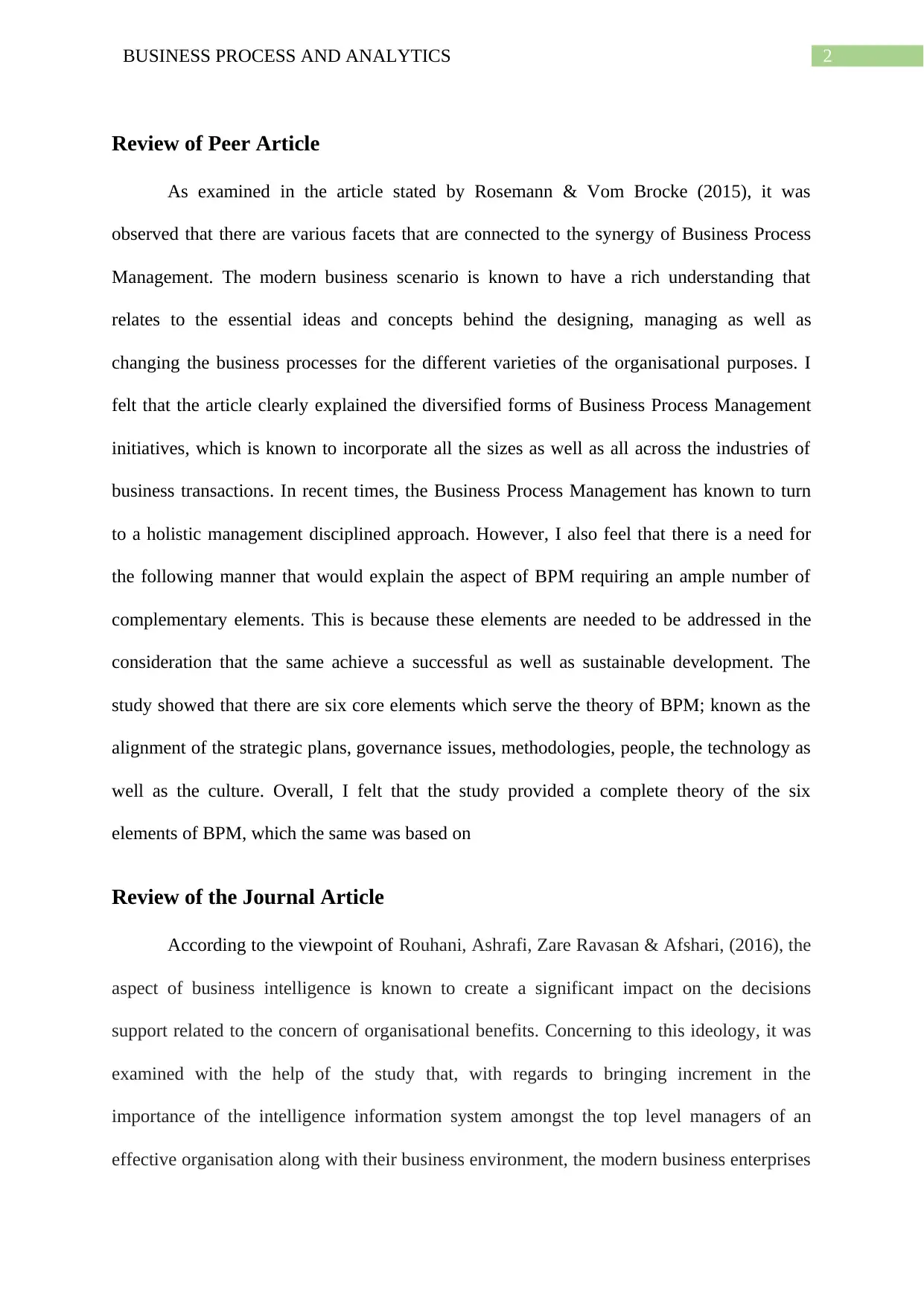
2BUSINESS PROCESS AND ANALYTICS
Review of Peer Article
As examined in the article stated by Rosemann & Vom Brocke (2015), it was
observed that there are various facets that are connected to the synergy of Business Process
Management. The modern business scenario is known to have a rich understanding that
relates to the essential ideas and concepts behind the designing, managing as well as
changing the business processes for the different varieties of the organisational purposes. I
felt that the article clearly explained the diversified forms of Business Process Management
initiatives, which is known to incorporate all the sizes as well as all across the industries of
business transactions. In recent times, the Business Process Management has known to turn
to a holistic management disciplined approach. However, I also feel that there is a need for
the following manner that would explain the aspect of BPM requiring an ample number of
complementary elements. This is because these elements are needed to be addressed in the
consideration that the same achieve a successful as well as sustainable development. The
study showed that there are six core elements which serve the theory of BPM; known as the
alignment of the strategic plans, governance issues, methodologies, people, the technology as
well as the culture. Overall, I felt that the study provided a complete theory of the six
elements of BPM, which the same was based on
Review of the Journal Article
According to the viewpoint of Rouhani, Ashrafi, Zare Ravasan & Afshari, (2016), the
aspect of business intelligence is known to create a significant impact on the decisions
support related to the concern of organisational benefits. Concerning to this ideology, it was
examined with the help of the study that, with regards to bringing increment in the
importance of the intelligence information system amongst the top level managers of an
effective organisation along with their business environment, the modern business enterprises
Review of Peer Article
As examined in the article stated by Rosemann & Vom Brocke (2015), it was
observed that there are various facets that are connected to the synergy of Business Process
Management. The modern business scenario is known to have a rich understanding that
relates to the essential ideas and concepts behind the designing, managing as well as
changing the business processes for the different varieties of the organisational purposes. I
felt that the article clearly explained the diversified forms of Business Process Management
initiatives, which is known to incorporate all the sizes as well as all across the industries of
business transactions. In recent times, the Business Process Management has known to turn
to a holistic management disciplined approach. However, I also feel that there is a need for
the following manner that would explain the aspect of BPM requiring an ample number of
complementary elements. This is because these elements are needed to be addressed in the
consideration that the same achieve a successful as well as sustainable development. The
study showed that there are six core elements which serve the theory of BPM; known as the
alignment of the strategic plans, governance issues, methodologies, people, the technology as
well as the culture. Overall, I felt that the study provided a complete theory of the six
elements of BPM, which the same was based on
Review of the Journal Article
According to the viewpoint of Rouhani, Ashrafi, Zare Ravasan & Afshari, (2016), the
aspect of business intelligence is known to create a significant impact on the decisions
support related to the concern of organisational benefits. Concerning to this ideology, it was
examined with the help of the study that, with regards to bringing increment in the
importance of the intelligence information system amongst the top level managers of an
effective organisation along with their business environment, the modern business enterprises
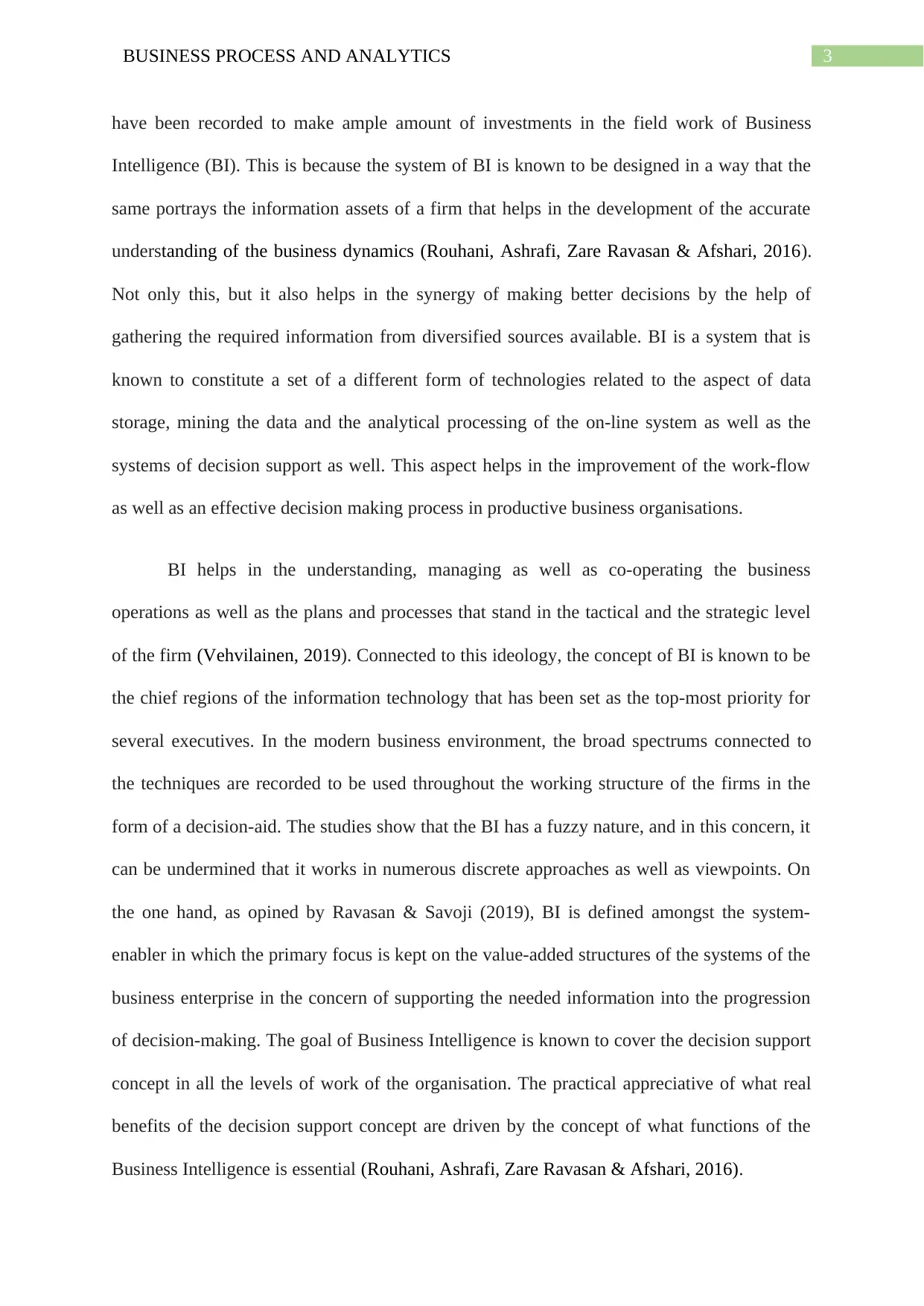
3BUSINESS PROCESS AND ANALYTICS
have been recorded to make ample amount of investments in the field work of Business
Intelligence (BI). This is because the system of BI is known to be designed in a way that the
same portrays the information assets of a firm that helps in the development of the accurate
understanding of the business dynamics (Rouhani, Ashrafi, Zare Ravasan & Afshari, 2016).
Not only this, but it also helps in the synergy of making better decisions by the help of
gathering the required information from diversified sources available. BI is a system that is
known to constitute a set of a different form of technologies related to the aspect of data
storage, mining the data and the analytical processing of the on-line system as well as the
systems of decision support as well. This aspect helps in the improvement of the work-flow
as well as an effective decision making process in productive business organisations.
BI helps in the understanding, managing as well as co-operating the business
operations as well as the plans and processes that stand in the tactical and the strategic level
of the firm (Vehvilainen, 2019). Connected to this ideology, the concept of BI is known to be
the chief regions of the information technology that has been set as the top-most priority for
several executives. In the modern business environment, the broad spectrums connected to
the techniques are recorded to be used throughout the working structure of the firms in the
form of a decision-aid. The studies show that the BI has a fuzzy nature, and in this concern, it
can be undermined that it works in numerous discrete approaches as well as viewpoints. On
the one hand, as opined by Ravasan & Savoji (2019), BI is defined amongst the system-
enabler in which the primary focus is kept on the value-added structures of the systems of the
business enterprise in the concern of supporting the needed information into the progression
of decision-making. The goal of Business Intelligence is known to cover the decision support
concept in all the levels of work of the organisation. The practical appreciative of what real
benefits of the decision support concept are driven by the concept of what functions of the
Business Intelligence is essential (Rouhani, Ashrafi, Zare Ravasan & Afshari, 2016).
have been recorded to make ample amount of investments in the field work of Business
Intelligence (BI). This is because the system of BI is known to be designed in a way that the
same portrays the information assets of a firm that helps in the development of the accurate
understanding of the business dynamics (Rouhani, Ashrafi, Zare Ravasan & Afshari, 2016).
Not only this, but it also helps in the synergy of making better decisions by the help of
gathering the required information from diversified sources available. BI is a system that is
known to constitute a set of a different form of technologies related to the aspect of data
storage, mining the data and the analytical processing of the on-line system as well as the
systems of decision support as well. This aspect helps in the improvement of the work-flow
as well as an effective decision making process in productive business organisations.
BI helps in the understanding, managing as well as co-operating the business
operations as well as the plans and processes that stand in the tactical and the strategic level
of the firm (Vehvilainen, 2019). Connected to this ideology, the concept of BI is known to be
the chief regions of the information technology that has been set as the top-most priority for
several executives. In the modern business environment, the broad spectrums connected to
the techniques are recorded to be used throughout the working structure of the firms in the
form of a decision-aid. The studies show that the BI has a fuzzy nature, and in this concern, it
can be undermined that it works in numerous discrete approaches as well as viewpoints. On
the one hand, as opined by Ravasan & Savoji (2019), BI is defined amongst the system-
enabler in which the primary focus is kept on the value-added structures of the systems of the
business enterprise in the concern of supporting the needed information into the progression
of decision-making. The goal of Business Intelligence is known to cover the decision support
concept in all the levels of work of the organisation. The practical appreciative of what real
benefits of the decision support concept are driven by the concept of what functions of the
Business Intelligence is essential (Rouhani, Ashrafi, Zare Ravasan & Afshari, 2016).
Secure Best Marks with AI Grader
Need help grading? Try our AI Grader for instant feedback on your assignments.
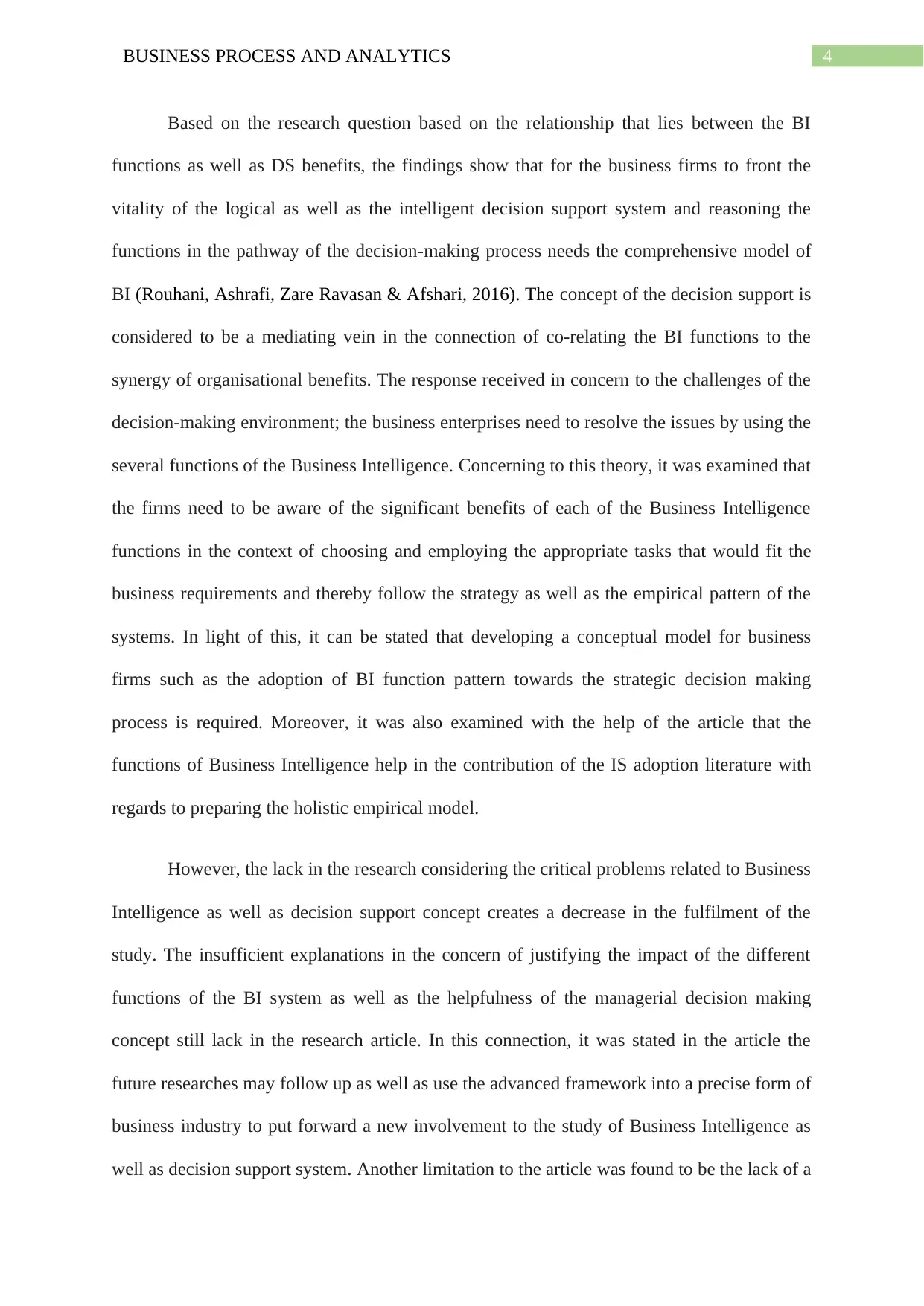
4BUSINESS PROCESS AND ANALYTICS
Based on the research question based on the relationship that lies between the BI
functions as well as DS benefits, the findings show that for the business firms to front the
vitality of the logical as well as the intelligent decision support system and reasoning the
functions in the pathway of the decision-making process needs the comprehensive model of
BI (Rouhani, Ashrafi, Zare Ravasan & Afshari, 2016). The concept of the decision support is
considered to be a mediating vein in the connection of co-relating the BI functions to the
synergy of organisational benefits. The response received in concern to the challenges of the
decision-making environment; the business enterprises need to resolve the issues by using the
several functions of the Business Intelligence. Concerning to this theory, it was examined that
the firms need to be aware of the significant benefits of each of the Business Intelligence
functions in the context of choosing and employing the appropriate tasks that would fit the
business requirements and thereby follow the strategy as well as the empirical pattern of the
systems. In light of this, it can be stated that developing a conceptual model for business
firms such as the adoption of BI function pattern towards the strategic decision making
process is required. Moreover, it was also examined with the help of the article that the
functions of Business Intelligence help in the contribution of the IS adoption literature with
regards to preparing the holistic empirical model.
However, the lack in the research considering the critical problems related to Business
Intelligence as well as decision support concept creates a decrease in the fulfilment of the
study. The insufficient explanations in the concern of justifying the impact of the different
functions of the BI system as well as the helpfulness of the managerial decision making
concept still lack in the research article. In this connection, it was stated in the article the
future researches may follow up as well as use the advanced framework into a precise form of
business industry to put forward a new involvement to the study of Business Intelligence as
well as decision support system. Another limitation to the article was found to be the lack of a
Based on the research question based on the relationship that lies between the BI
functions as well as DS benefits, the findings show that for the business firms to front the
vitality of the logical as well as the intelligent decision support system and reasoning the
functions in the pathway of the decision-making process needs the comprehensive model of
BI (Rouhani, Ashrafi, Zare Ravasan & Afshari, 2016). The concept of the decision support is
considered to be a mediating vein in the connection of co-relating the BI functions to the
synergy of organisational benefits. The response received in concern to the challenges of the
decision-making environment; the business enterprises need to resolve the issues by using the
several functions of the Business Intelligence. Concerning to this theory, it was examined that
the firms need to be aware of the significant benefits of each of the Business Intelligence
functions in the context of choosing and employing the appropriate tasks that would fit the
business requirements and thereby follow the strategy as well as the empirical pattern of the
systems. In light of this, it can be stated that developing a conceptual model for business
firms such as the adoption of BI function pattern towards the strategic decision making
process is required. Moreover, it was also examined with the help of the article that the
functions of Business Intelligence help in the contribution of the IS adoption literature with
regards to preparing the holistic empirical model.
However, the lack in the research considering the critical problems related to Business
Intelligence as well as decision support concept creates a decrease in the fulfilment of the
study. The insufficient explanations in the concern of justifying the impact of the different
functions of the BI system as well as the helpfulness of the managerial decision making
concept still lack in the research article. In this connection, it was stated in the article the
future researches may follow up as well as use the advanced framework into a precise form of
business industry to put forward a new involvement to the study of Business Intelligence as
well as decision support system. Another limitation to the article was found to be the lack of a
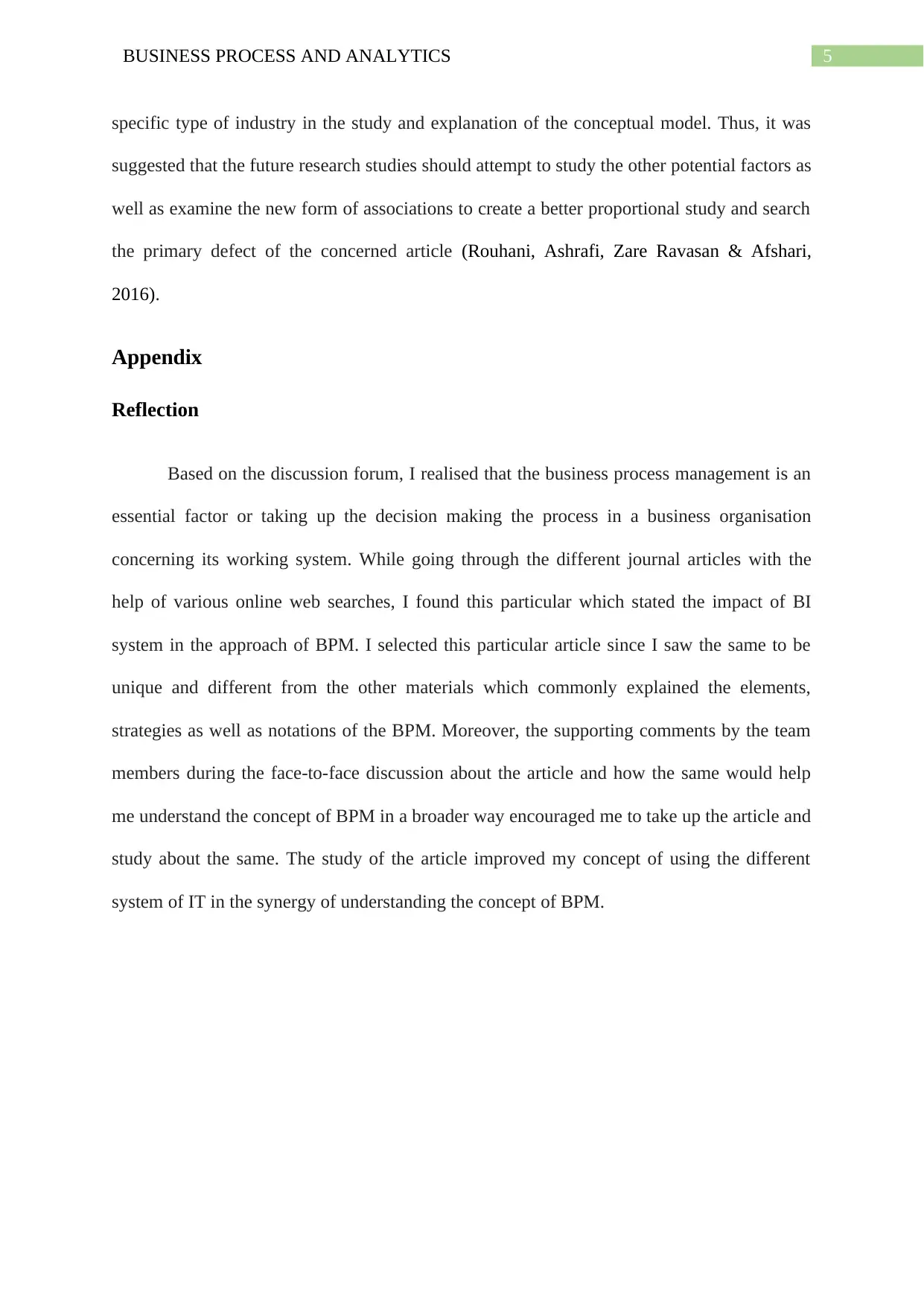
5BUSINESS PROCESS AND ANALYTICS
specific type of industry in the study and explanation of the conceptual model. Thus, it was
suggested that the future research studies should attempt to study the other potential factors as
well as examine the new form of associations to create a better proportional study and search
the primary defect of the concerned article (Rouhani, Ashrafi, Zare Ravasan & Afshari,
2016).
Appendix
Reflection
Based on the discussion forum, I realised that the business process management is an
essential factor or taking up the decision making the process in a business organisation
concerning its working system. While going through the different journal articles with the
help of various online web searches, I found this particular which stated the impact of BI
system in the approach of BPM. I selected this particular article since I saw the same to be
unique and different from the other materials which commonly explained the elements,
strategies as well as notations of the BPM. Moreover, the supporting comments by the team
members during the face-to-face discussion about the article and how the same would help
me understand the concept of BPM in a broader way encouraged me to take up the article and
study about the same. The study of the article improved my concept of using the different
system of IT in the synergy of understanding the concept of BPM.
specific type of industry in the study and explanation of the conceptual model. Thus, it was
suggested that the future research studies should attempt to study the other potential factors as
well as examine the new form of associations to create a better proportional study and search
the primary defect of the concerned article (Rouhani, Ashrafi, Zare Ravasan & Afshari,
2016).
Appendix
Reflection
Based on the discussion forum, I realised that the business process management is an
essential factor or taking up the decision making the process in a business organisation
concerning its working system. While going through the different journal articles with the
help of various online web searches, I found this particular which stated the impact of BI
system in the approach of BPM. I selected this particular article since I saw the same to be
unique and different from the other materials which commonly explained the elements,
strategies as well as notations of the BPM. Moreover, the supporting comments by the team
members during the face-to-face discussion about the article and how the same would help
me understand the concept of BPM in a broader way encouraged me to take up the article and
study about the same. The study of the article improved my concept of using the different
system of IT in the synergy of understanding the concept of BPM.
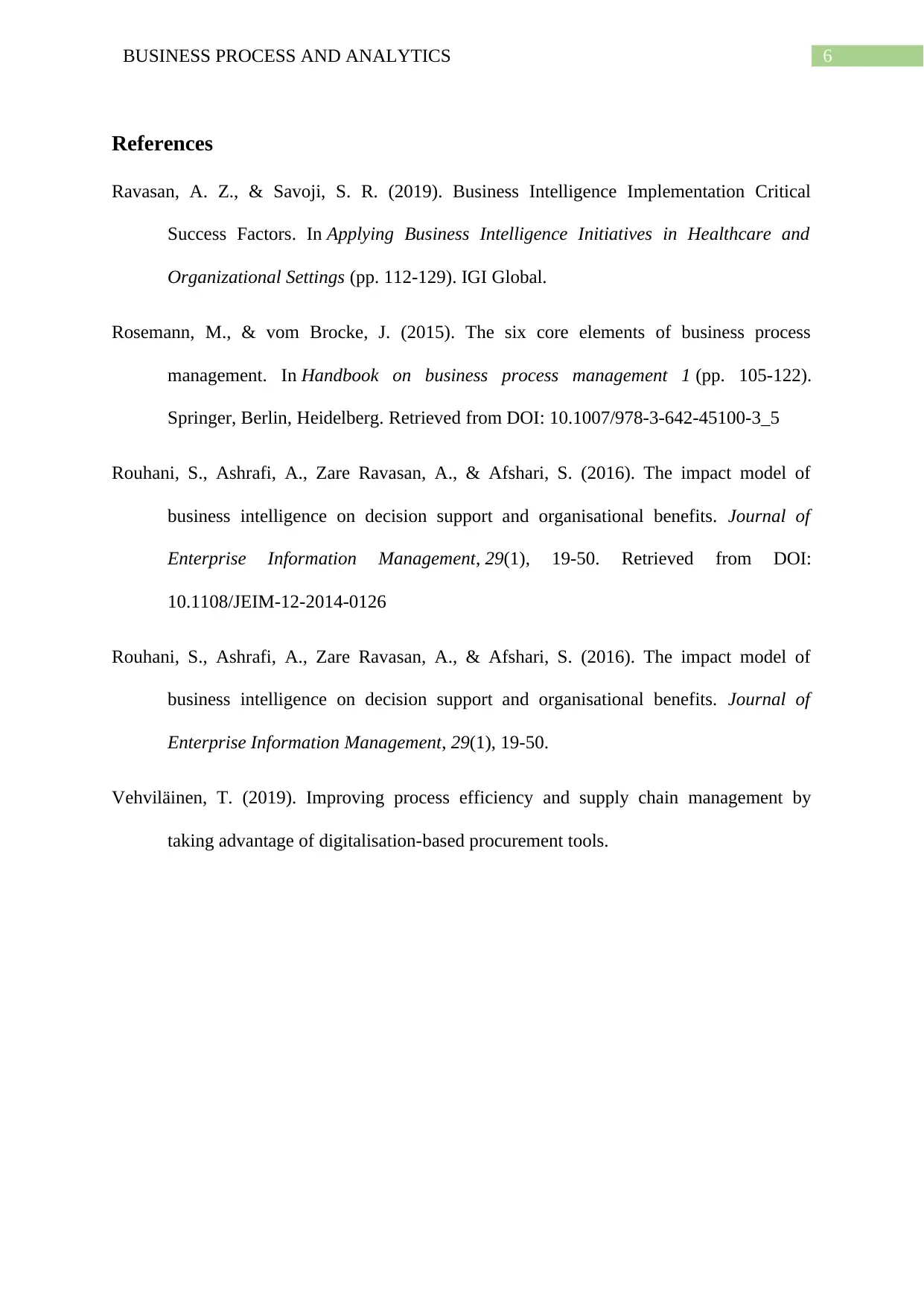
6BUSINESS PROCESS AND ANALYTICS
References
Ravasan, A. Z., & Savoji, S. R. (2019). Business Intelligence Implementation Critical
Success Factors. In Applying Business Intelligence Initiatives in Healthcare and
Organizational Settings (pp. 112-129). IGI Global.
Rosemann, M., & vom Brocke, J. (2015). The six core elements of business process
management. In Handbook on business process management 1 (pp. 105-122).
Springer, Berlin, Heidelberg. Retrieved from DOI: 10.1007/978-3-642-45100-3_5
Rouhani, S., Ashrafi, A., Zare Ravasan, A., & Afshari, S. (2016). The impact model of
business intelligence on decision support and organisational benefits. Journal of
Enterprise Information Management, 29(1), 19-50. Retrieved from DOI:
10.1108/JEIM-12-2014-0126
Rouhani, S., Ashrafi, A., Zare Ravasan, A., & Afshari, S. (2016). The impact model of
business intelligence on decision support and organisational benefits. Journal of
Enterprise Information Management, 29(1), 19-50.
Vehviläinen, T. (2019). Improving process efficiency and supply chain management by
taking advantage of digitalisation-based procurement tools.
References
Ravasan, A. Z., & Savoji, S. R. (2019). Business Intelligence Implementation Critical
Success Factors. In Applying Business Intelligence Initiatives in Healthcare and
Organizational Settings (pp. 112-129). IGI Global.
Rosemann, M., & vom Brocke, J. (2015). The six core elements of business process
management. In Handbook on business process management 1 (pp. 105-122).
Springer, Berlin, Heidelberg. Retrieved from DOI: 10.1007/978-3-642-45100-3_5
Rouhani, S., Ashrafi, A., Zare Ravasan, A., & Afshari, S. (2016). The impact model of
business intelligence on decision support and organisational benefits. Journal of
Enterprise Information Management, 29(1), 19-50. Retrieved from DOI:
10.1108/JEIM-12-2014-0126
Rouhani, S., Ashrafi, A., Zare Ravasan, A., & Afshari, S. (2016). The impact model of
business intelligence on decision support and organisational benefits. Journal of
Enterprise Information Management, 29(1), 19-50.
Vehviläinen, T. (2019). Improving process efficiency and supply chain management by
taking advantage of digitalisation-based procurement tools.
1 out of 7
Your All-in-One AI-Powered Toolkit for Academic Success.
+13062052269
info@desklib.com
Available 24*7 on WhatsApp / Email
![[object Object]](/_next/static/media/star-bottom.7253800d.svg)
Unlock your academic potential
© 2024 | Zucol Services PVT LTD | All rights reserved.